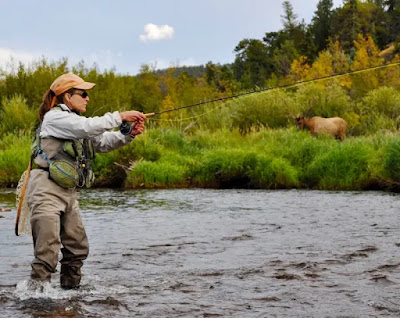 |
| Fly-fishing in Colorado (Colorado Parks & Wildife photo) |
I am writing this from northern New Mexico, where there are some trout streams — and the usual controveries over landowners blocking access.
Earlier this month, the New Mexico Supreme Court issued an important decision:
The court’s long-awaited opinion further clarifies its March 1 oral decision, which overturned a State Game Commission rule that allowed private landowners to exclude the public from streams flowing through their property. This unanimous decision, as many anglers interpreted it, effectively re-established the public’s constitutional right to wade and fish in these streams.
The court explained that the public’s right to fish and recreate in New Mexico streams has always superseded a private landowner’s right to exclude the public from privately owned streambeds. The justices stressed that as long as the public does not trespass on privately owned lands to access public water, they have every right to walk on and float over these streambeds in order to fish.
Meanwhile, the New York Times has noticed the access war on Colorado rivers, with a case sparked by angler Roger Hill, 81, who enjoys fishing the Arkansas but has encountered viscious opposition by riverside landowners.
The exploding popularity of the outdoors, fueled in part by the limits of the pandemic, has brought a new term to what has long been an etiquette-obsessed sport: combat fishing.
“I tried to take my son fishing last spring,” said Flora Jewell-Stern of Denver, a member of the first all-female team to win the state’s prestigious Superfly tournament. “There was nowhere to park for three miles. And it was a Wednesday.”
For advocates of public access, an upside to the conflict has been the formation of an increasingly assertive alliance of rafters, hunters, kayakers and other river users. Many see themselves as defending more than just pastimes.
Colorado does not have a definitive high-court opinion, but one will be coming. At issue, whether a river or stream is "navigable," which means accessible.
“We’re a total outlier,” said Mark Squillace, an environmental law professor at the University of Colorado who is representing Mr. Hill. “Standing in the bed of the river is something the U.S. Supreme Court has explicitly guaranteed, and the idea that Colorado would try to deny those rights, which are enjoyed by the citizens of every other state, is pretty shocking.”Mr. Hill would like the state to clarify its position in the face of his historical evidence, which mainly consists of newspaper clippings from the 1870s demonstrating that the Arkansas was at the time flooded with timber used for railroad construction.
“There’s no doubt it’s navigable,” he said.
The attorney general has argued that Mr. Hill lacks standing; the State Supreme Court is reviewing the case, potentially paving the way for a trial this fall.
No comments:
Post a Comment